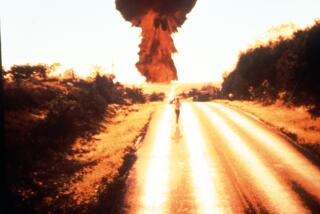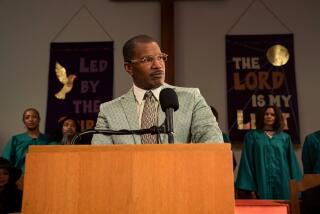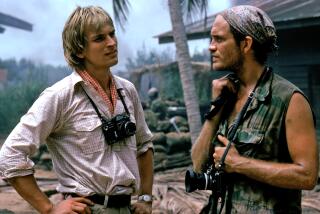Powerful ‘Dead’ Raises Timeless Questions
- Share via
“Waking the Dead” is a powerful story of love and politics in the ‘70s and ‘80s and their bittersweet aftermath. It is a film of uncommon intelligence and rigor that illuminates a complex era, and the romance at its center is also one of exceptional passion and honesty. Beyond this, it establishes Billy Crudup as an authentic star who can carry a challenging film, and it offers further proof that Jennifer Connelly is a fresh, vibrant presence on the screen.
It has been adapted from Scott Spencer’s novel by Robert Dillon with a consummate skill matched by Keith Gordon’s direction, which mixes much care with considerable riskiness. “Waking the Dead” shifts smoothly between 1972-74 and 1982, with stopovers in between and beyond, allowing sufficient time in each period for us to become involved with what’s happening at that moment.
Young Coast Guard officer Fielding Pierce (Crudup) meets Connelly’s Sarah Williams in the office of Fielding’s counterculture publisher-brother (Paul Hipp) in Chicago in 1972. The attraction between them is far more than sexual, strong as it is. They are idealists who deplore the Vietnam War with equal fervor, yet from Day 1 their approaches to activism differ and clash.
Fielding is the son of a union leader and he already has the U.S. Congress as his goal whereas Sarah is a fiery radical. Fielding wants to effect change within the system whereas Sarah would tear it down if it would end the war in Southeast Asia--or resolve any other military or political crises.
By 1974 their love is severely tested when Sarah participates in a dangerous mission to rescue a couple from Pinochet’s Chile. While Sarah is chauffeuring the couple back in Chicago, a fire bomb kills all of them.
As devastated as Fielding is, he deals with tragedy the way most people do, by getting on with his life. Now it’s 1982, and at 32 Fielding is in fact running for Congress. (Paving the way is a senator, played by Ed Harris, who resigned when caught up in a sex scandal.) Fielding is involved with the eminently suitable niece (Molly Parker) of his political mentor (Hal Holbrook). On the eve of his campaign, while on a solitary stroll, Fielding thinks he hears Sarah’s voice, and as the campaign progresses he hears her more and more, and even thinks he spots her on the street. He is flooded with emotion and longing, and this haunting sense of Sarah’s presence also makes him question what he thinks he can accomplish in public office.
Whether Sarah is a figment of his imagination, manifesting itself under the stress of campaigning, or a supernatural phenomenon, is unclear; either way Fielding is truly put to the test. Not only is Fielding’s ordeal potentially jeopardizing his campaign by distracting him increasingly but also calls into question his very sanity. The only person Fielding feels comfortable confiding in is his sister (Janet McTeer), an artist who comforts him but urges him to concentrate on the campaign and deal with the specter--if that is what it is--of Sarah afterward.
The way in which Fielding’s predicament plays out is the reason this film is so impressive and satisfying. It evokes the eras it spans and raises timeless questions of values, priorities and of the roles ideals and emotions play in the lives of those committed to making a difference, one way or another. The seeming presence of Sarah creates a special challenge for Gordon and his stars, and that “Waking the Dead” deals with it so imaginatively, makes the film all the richer and provocative an experience.
* MPAA rating: R, for sexuality and language. Times guidelines: appropriate for mature teens; language, adult themes and situations.
‘Waking the Dead’
Billy Crudup: Fielding Pierce
Jennifer Connelly: Sarah Williams
Janet McTeer: Caroline Pierce
Hal Holbrook: Isaac Green
A USA Films release of a Gramercy Pictures presentation. Director Keith Gordon. Producers Gordon, Stuart Kleinman, Linda Reisman. Executive producer Jodie Foster. Screenplay by Robert Dillon; based on the novel by Scott Spencer. Cinematographer Tom Richmond. Editor Jeff Wishengrad. Music tomandandy. Costumes Renee April. Production designer Zoe Sakellaropoulo. Set decorators Simon Lahaye, Joelle Turenne. Running time: 1 hour, 46 minutes.
At selected theaters.
More to Read
Only good movies
Get the Indie Focus newsletter, Mark Olsen's weekly guide to the world of cinema.
You may occasionally receive promotional content from the Los Angeles Times.










